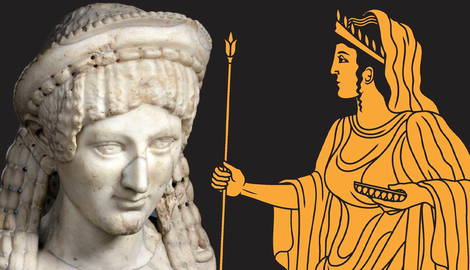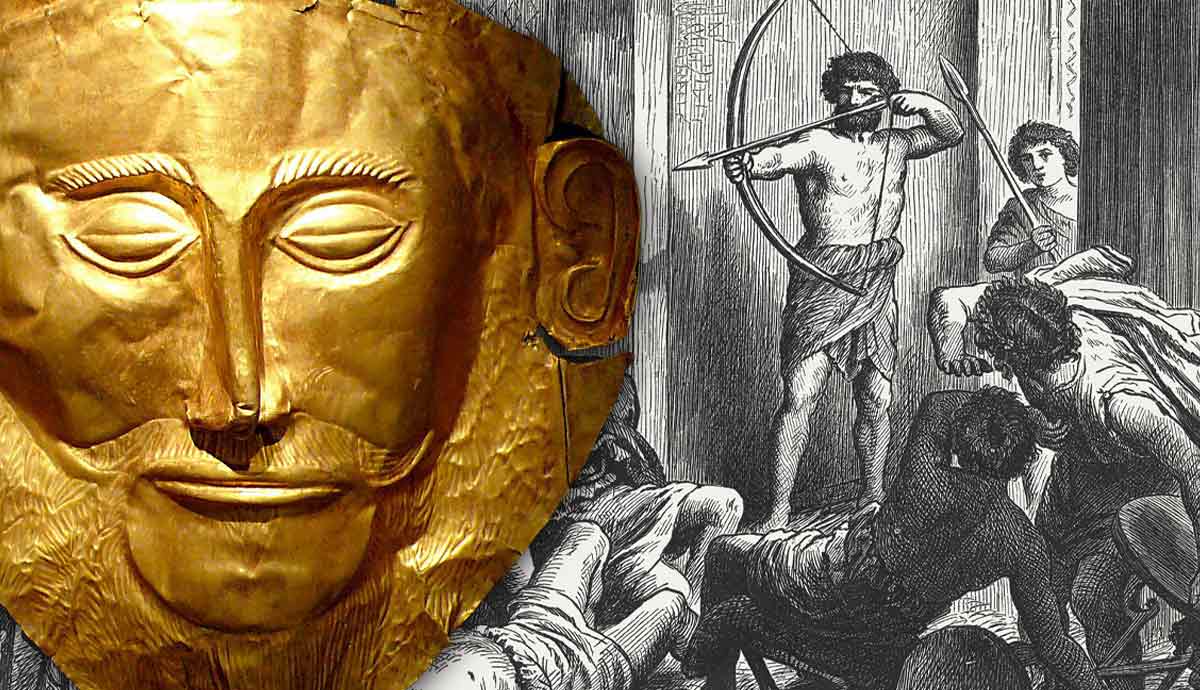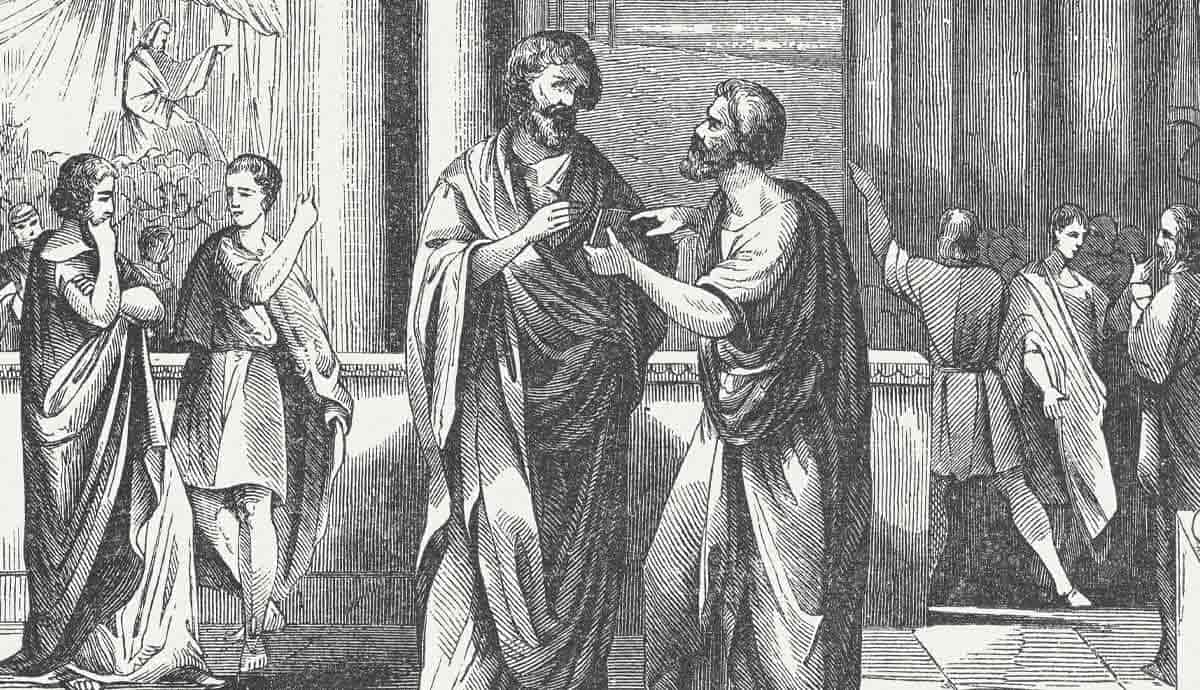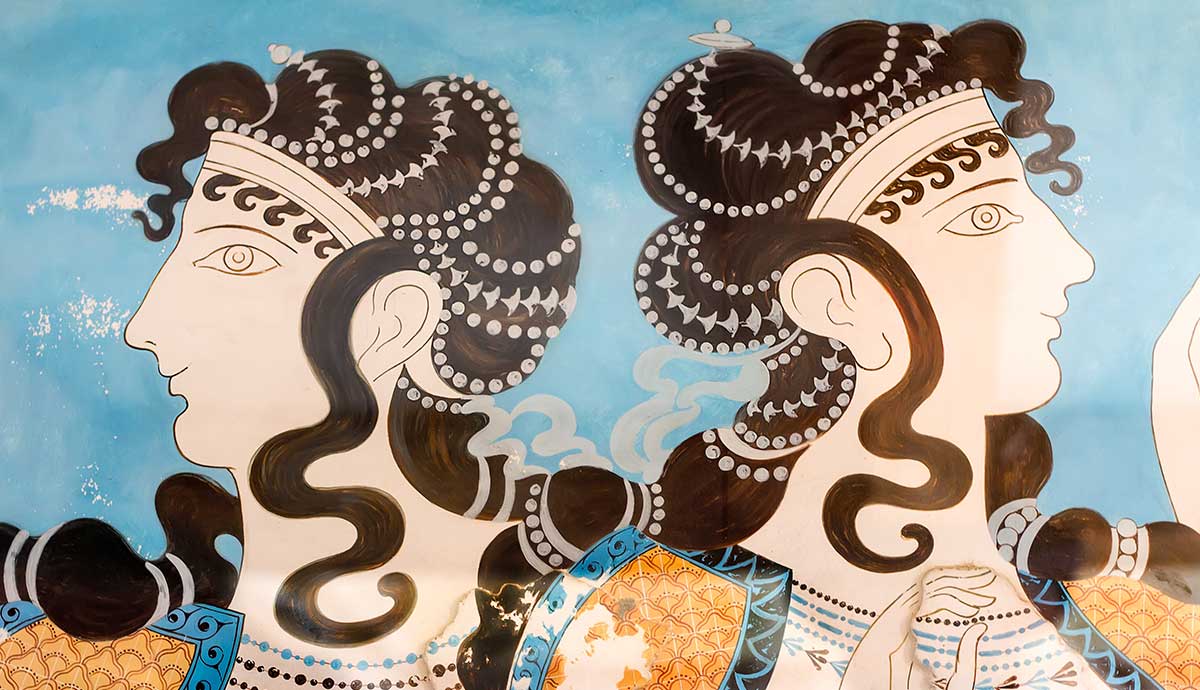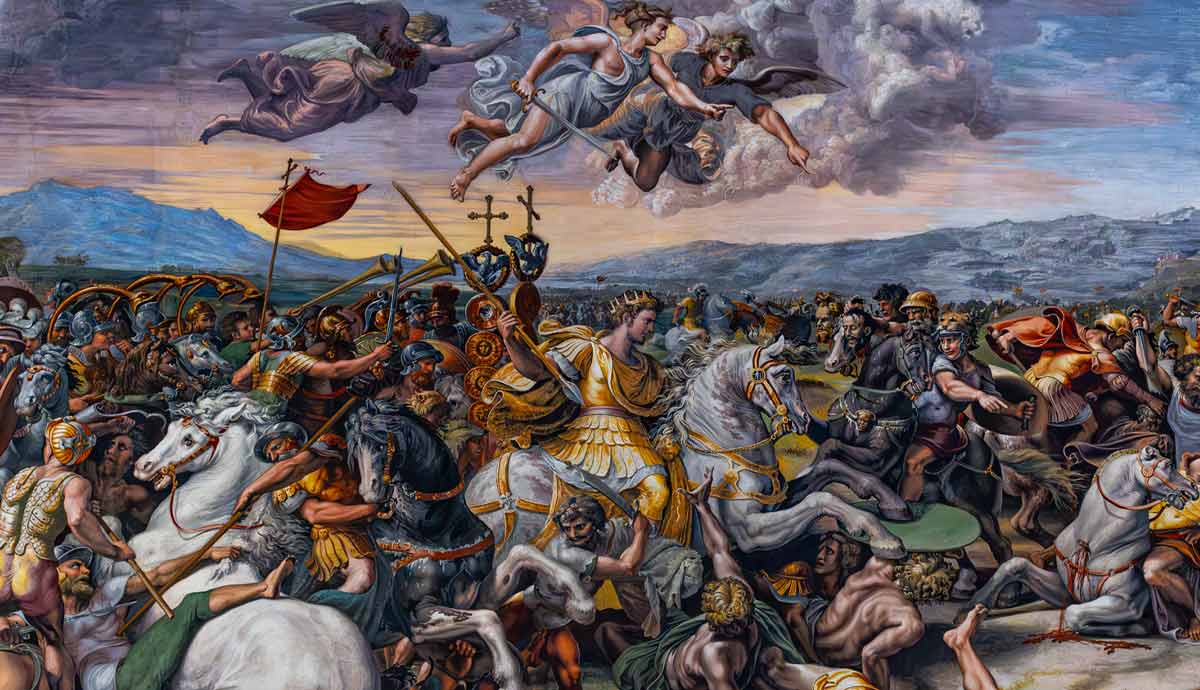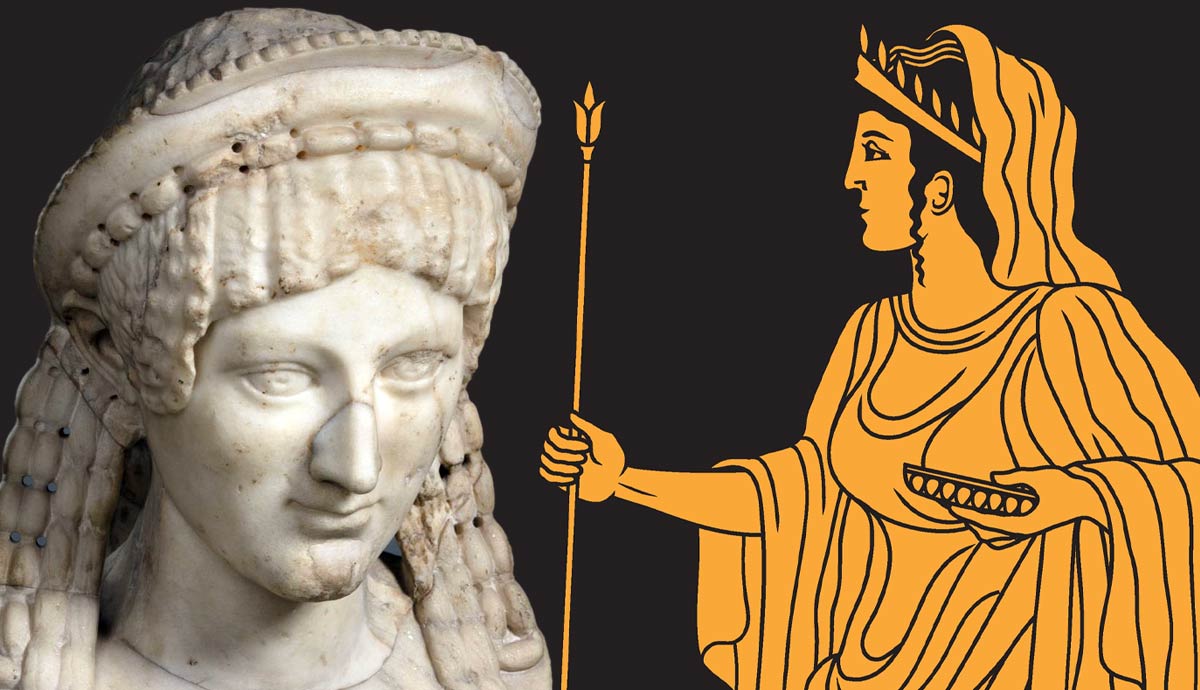
In Greek mythology, Hera was the goddess of women, marriage and married life. She was the queen of the gods by her marriage to Zeus. In art, she was generally depicted wearing a crown and a peplos, a long sleeveless robe that was customary for women in ancient Greece. She was a powerful and clever goddess, yet her role in mythology is mainly as Zeus’ jilted wife. Though capable of benevolence, she is mostly remembered for her vengeful nature and the punishments she inflicted on those who had slighted her. Below are nine of the most important stories about Hera from Greek mythology.
1. Birth of Hera and Marriage to Zeus

Hera was the daughter of the Titan gods Cronus (spelled Kronos in Greek) and Rhea. Her father had received a prophecy from Gaia that one of his children would overthrow him as he had overthrown his own father. To avoid this fate, he took each of his children as they were born and swallowed them whole, including Hera. When Zeus was born, Rhea saved him by tricking Cronus into swallowing a stone instead. The god grew and eventually saved his siblings by forcing Cronus to regurgitate them.
After she was freed, Hera participated in a decade-long war known as the Titanomachy between the Titans, the older generation of gods, and the Olympians, the newer generation of gods led by Zeus. The Olympians were ultimately victorious and Zeus was made king of the gods. After this, he took many wives, the last of which was Hera.
In order to seduce Hera, Zeus changed himself into a cuckoo bird and let Hera catch him and keep him as her pet. Zeus then revealed himself and Hera agreed to marry him. Their wedding was a luxurious affair, attended by all the gods and presided over by the Fates. The gods gave them wondrous gifts, such as a garden of golden apples that were guarded by a dragon.
2. Birth of Hephaestus

When Zeus birthed Athena from his head, Hera became enraged. She didn’t appreciate her husband having children that weren’t by her. Since Athena was considered to have been born of Zeus alone, Hera decided to punish Zeus by having a child of her own in the same manner. Without prior intercourse, Hera gave birth to Hephaestus (Hephaistos in ancient Greek), the god of the forge and fire. But he was born lame, which shamed the goddess, so she cast him down from Mount Olympus.
In revenge, Hephaestus built Hera a throne with invisible chains and sent it to Mount Olympus as a present. When Hera sat in it, she was bound fast to the seat and he refused to let her go. It was only with the intervention of Dionysus, who got Hephaestus drunk, that Hera was finally released.
3. Semele and Dionysus

Semele was one of Zeus’ mortal lovers and the mother of Dionysus. Zeus tried to hide the affair, but Hera knew of his infidelity. To get her revenge, she disguised herself as Semele’s elderly nurse. In this disguise, she convinced Semele to ask Zeus to prove that he was truly a god by revealing his true form to her.
The next time Zeus came to her, she asked him for a gift. Hoping to impress, Zeus swore an unbreakable vow on the river Styx that he would grant her anything she wanted. Semele asked that he reveal his true form as Hera had cunningly suggested. He didn’t want to, but he couldn’t break his oath. Zeus revealed his divine form and Semele was instantly burned alive by his magnificence. Other sources relate that he appeared to her with a chorus of thunder and lightning, and Semele was so surprised that she died of fright.
Learning that she was pregnant with his child, Zeus rescued the unborn fetus and stitched it to his thigh to continue growing. When the child came to term, Zeus undid the stitches and Dionysus was born. Zeus gave the child to Hermes and had him take Dionysus to Ino and Athamas to raise. But Hera drove them mad, causing them to murder their own children. Zeus saved Dionysus and brought him to Mount Nysa in Asia. When Dionysus was grown, Hera drove him insane as well.
4. Hera Terrorizing Io

Io was another of Zeus’ lovers. According to Ovid’s Metamorphoses, so that the affair would not be exposed to Hera, Zeus transformed Io into a cow. But Hera wasn’t deceived. She asked for the cow as a gift, to which Zeus had no reasonable excuse not to oblige her. He gave her the cow Io and Hera placed her on top of a mountain to be guarded by a hundred-eyed giant named Argus. Zeus eventually tasked Hermes with rescuing Io from the giant. Hermes lulled the giant to sleep by playing the flute, then decapitated him and threw his head down the mountainside.
Despite being freed from the giant, Io continued to be tormented by Hera. The goddess sent a gadfly to constantly pester and bite her, and she even sent one of the Furies to drive her mad. Trying to escape from her suffering, Io wandered the world until she eventually came to Egypt. On the banks of the Nile she pleaded with Zeus to put an end to her suffering. The king of the gods heard her and implored Hera to turn her back to normal. Hera reluctantly obliged when Zeus promised never to be unfaithful with Io again.
5. Hatred of Heracles

Hera’s hatred of Heracles is the most well-documented of any myth to come out of ancient Greece. From the moment of his birth and through all of his labors she opposed his every step. Heracles was the son of Zeus and Alcmene, the queen of Tiryns. Zeus disguised himself as her husband, who was away at war, and spent three nights with her resulting in her pregnancy with Heracles.
As with all of Zeus’ infidelities, Hera expressed her anger at Zeus by exacting revenge on his lovers. With Heracles in mind, Zeus declared that the next child born from the line of Perseus would be king of Mycenae. To foil his plans Hera delayed Heracles’ birth so that his cousin, Eurystheus, was born first. Zeus’ decree came to pass and Eurystheus became the king.
When Heracles was born, his mother feared Hera’s wrath, so she left the baby out in a field to die of exposure. Athena happened by this field with Hera, and she convinced her to breastfeed the baby. Hera was unaware that this baby was Heracles so she gave him her breast. The baby nursed so violently that he caused her pain. When she could no longer endure it, Hera cast the child aside.
Athena, seemingly aware of the child’s identity, snatched him up and brought him back to his mother, urging her to raise him. When he was barely eight months old, Hera sent snakes to murder him in the cradle. Her plan failed when baby Heracles strangled them both with his bare hands.
Hera’s vendetta against Heracles continued throughout his adulthood. After a battle with the Minyans, she caused him to go insane and murder his own wife and children. To atone for this crime, Heracles was tasked with serving his cousin Eurystheus and performing the famous twelve labors. Hera antagonized him for a number of them and even orchestrated some, such as the Nemean Lion and the Hydra. She incited the Amazons to attack him by spreading a rumor that he was trying to abduct their queen. When he was driving the Geryon cattle back to Greece, she sent a gadfly to scatter them and forced him to corral them again.

After his labors, Heracles sacked the city of Troy because their king, Laomedon, had at an earlier time refused to pay Heracles for rescuing his daughter from a sea monster. When he was sailing away, Hera sent a terrible storm that nearly killed him. Zeus was so furious that he bound his wife with chains, tied anvils to her feet, and then suspended her from the sky.
6. Coup Against Zeus

In a brief few passages in Homer’s Iliad there is mention of a coup attempt against Zeus perpetrated by some of the other Olympians. The members of this coup were Poseidon, Apollo, Athena, and Hera. Zeus punished Poseidon and Apollo by forcing them to serve the Trojan king, Laomedon, and Athena seems to have faced no punishment at all. Hera’s punishment was more severe. Zeus again strung her up by the wrists and hung anvils from her feet.
7. Favor for Jason

Hera was a consistent ally of Jason during his quest to retrieve the Golden Fleece. There are two reasons why she helped him. Firstly, she was angry at the current king of Iolchos, Pelias, for usurping Jason’s father, Aeson. Secondly, as told in Hyginus’ Fabulae 22, Hera had once come down from Olympus disguised as an elderly woman to test the minds of men and see if they would help carry her across a river. Everyone who crossed ignored her, except for Jason. To show her gratitude, she blessed Jason with her favor.
In his quest to retrieve the Golden Fleece from king Aeëtes of Colchis, Hera provided Jason with aid on several occasions. When sailing past the Clashing Rocks, a sea passage bounded by cliffs on either side that crashed together with the force of the wind, Hera helped them make it through without being crushed. She also summoned Thetis to steer them around two active volcanoes called the Wandering Rocks. When they arrived in Colchis, Hera asked Aphrodite to make the princess, Medea, fall in love with Jason. Medea then helped him get past the tasks king Aeëtes demanded he perform. He was able to retrieve the fleece and sail away unharmed, with a new bride in tow.
8. Apple of Discord and the Judgment of Paris

Recounted in Hyginus’ Fabulae 92, all the gods were invited to the wedding of Peleus and the goddess Thetis, except for Eris, goddess of strife. Feeling rejected, Eris threw a golden apple into the middle of the party. Written on the apple was the message, “To the most beautiful.” Hera, Athena, and Aphrodite all proclaimed themselves the most beautiful and fought over who deserved the apple. To settle the dispute, Zeus selected a neutral judge, a mortal by the name of Paris.
Paris was the long lost son of Priam, king of Troy. When asked to judge the contest, he accepted, and each goddess offered him a bribe if he picked them. Hera offered him dominion over every kingdom; Athena offered him great military victories and skill in all crafts; and Aphrodite offered him the most beautiful mortal woman in the world. Paris chose Aphrodite and she promised him Helen of Sparta. Hera was furious at Paris’ choice and vowed revenge on every Trojan alive.
9. The Iliad

Hera was a major and active participant in the events of The Iliad. Unlike some of the gods who aided one side or the other depending on their whims, Hera was a staunch ally of the Greeks. Still furious with Paris over choosing Aphrodite as the most beautiful goddess, Hera did everything in her considerable power to punish the Trojans. Throughout the narrative, Hera rouses the Greeks to fight harder, instilling courage and ferocity in them. Her zealous support of the Greeks and hatred for the Trojans repeatedly brings her into conflict with Zeus and other gods.
An example is in Book 14. Zeus had forbidden the gods from interfering in the war and the Trojans gained the upper hand in battle, so Hera seduced Zeus and lured him to bed. She then persuaded Hypnos, the personification of sleep, to keep him asleep. Hera returned to the battle and convinced Poseidon to help the Greeks turn the tide. When Zeus finally awoke, he was furious at Hera’s deception and threatened to punish her if she ever deceived him again.
Her wrath against the Trojans didn’t end with the Trojans themselves, but even extended to the gods who aided them. In Book 21, Hera faced off against Artemis, goddess of the hunt and sister of Apollo. She humiliated the arrogant younger goddess with ease, stripping off the bow and quiver from Artemis’ shoulder and knocking her across the head with them.
In all her stories, Hera is the archetype of a woman scorned.
